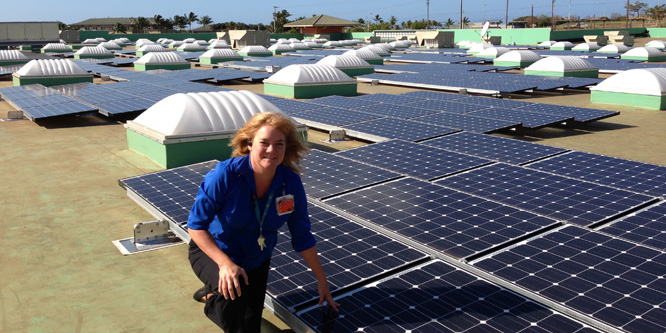
Photo: Walmart
Can retailers drive climate change action?
With the elevated environmental risks posed by this year’s hurricane and wildfire seasons in the U.S. as a backdrop, Walmart, Amazon.com and REI this week launched major climate change initiatives.
On Monday, Walmart announced a goal to target zero emissions across global operations by 2040. Further, the company made a second commitment to protect, manage or restore at least 50 million acres of land and one million square miles of ocean by 2030.
“We want to play an important role in transforming the world’s supply chains to be regenerative,” said CEO Doug McMillon in a statement.
Amazon, which last year committed to zeroing out its carbon footprint by 2040, on Wednesday rolled out a new “Climate Pledge Friendly” label, which highlights items that have been certified as sustainable. A dedicated storefront lets shoppers browse by category or search for products bearing the green label. Amazon also introduced a new certification for products designed to reduce carbon emissions, “Compact by Design.”

“With 18 external certification programs and our own Compact by Design certification, we’re incentivizing selling partners to create sustainable products that help protect the planet for future generations,” said CEO Jeff Bezos in a statement.
On Thursday, REI committed to becoming carbon neutral this year by purchasing carbon credits expected “in the millions” to cover shortfalls. REI further set a goal to reduce emissions in line with the U.N. Intergovernmental Panel on Climate Change’s (IPCC) findings that global emissions must be reduced by 55 percent by 2030 to avoid the worst effects of climate change.
With REI’s footprint including products sold, vendors will be pushed to further reduce emissions. The company will prioritize reforestation, renewable and clean energy, pursuing recycled and lower impact materials in manufacturing, and eliminating excess packaging as part of its commitment.
In an interview with RetailWire, REI President and CEO Eric Artz said the major difference versus past sustainability efforts is the sequestration holding REI accountable for internal greenhouse gases that he expects will drive innovation in search of solutions. While REI directly benefits from acting green, he believes other retailers gain a positive “ripple effect” from such actions.
Said Mr. Artz, “It’s not only the right thing to do, it’s good business.”
Discussion Questions
DISCUSSION QUESTIONS: How large a role will retailers and the overall consumer products industry likely play in helping to highlight and battle climate change? Are climate commitments for retailers a responsibility, a marketing opportunity or a little bit of both?


These commitments are a marketing opportunity, but hopefully not cynical ones. I believe the companies will work towards those goals but, let’s face it, nobody actually knows how to do it or do it and make money at it. Meanwhile, while they work towards being carbon neutral, the marketing will get others at least thinking about the problem and that’s a good side benefit.
Retailers can drive climate change action. Many retailers are all about the outdoors and the environment. However it should not be incumbent upon them to take the reins on climate action. There are more influential businesses, and there is government to take on those roles as they are the biggest contributors to climate change due to global warming.
Climate issues are huge. They are not going to be solved by Walmart, Amazon or REI. But the more large companies that dedicate themselves to doing it, the closer we will get. (Bravo to California for its position on automobiles.) The measurable difference of a contribution of a Walmart or Amazon is small. But efforts like these added up across the world become big.
“Greenwashing” by CPG companies has been prevalent for years and will likely continue. I believe however, that Walmart and Amazon are very serious. Now, let’s see Target and FedEx and UPS make the same commitments. (Maybe they have and I missed them.)
There is a wonderful program that gives one the feeling that an individual can do something small and it will help with the climate big time.
When it comes to the environment, every little bit helps, at least a little. Whether or not retailers can significantly impact climate change remains to be seen, but they can clearly raise the profile of environmental issues and practices. Is this a case of doing well by “doing good?” Sure, but what difference does it make? Of course there’s more hype than hope at this point, but as I said, every little bit helps.
The corporate governance model is morphing beyond pure financial outcomes to broad measures of economic wellness that encompass the environment. The underlying goal remains: to have a thriving enterprise that rewards investors and stakeholders. Over the long term, doing well and doing good can be mutually reinforcing. Bravo to these brands and leaders; they demonstrate the foresight and determination necessary to lead the retail and consumer products industry.
Climate change is a large, significant, and difficult problem to solve. While large companies like Walmart, REI, and Amazon certainly do have an impact, they are not enough to create the level of change required to have a global impact. However they can draw needed attention to the issue and serve as an inspiration to others to act. This is especially true in terms of galvanizing support for change when governments are unable or unwilling to act. Knowing the business community is willing to act can have a positive influence on issues like climate change.
If you owned 900 million square feet of rooftop space and could cover half of it with photovoltaics, do you think that might make a meaningful difference in the nation’s energy production? That’s the situation Walmart finds itself in today with its 5,000+ stores and 150+ distribution center locations. Failing to capture the available solar energy that falls on those buildings every day is a waste of epic proportions.
Sure it’s a non-trivial undertaking to outfit its physical plant with that many solar panels. Those things are not free. But the financial incentive seems clear to me. Kilowatts are the largest variable cost for retailers after labor.
And electricity is just one relevant dimension where Walmart must consider its environmental impact. Transportation is another, are are the practices of its suppliers.
Then there’s the matter of corporate citizenship to consider. When your footprint on the society is that vast, every operational decision you make has a magnified consequence on health and prosperity. Walmart appears to grasp that zero-emissions is necessary and attainable goal. The company may be acting in self-interest, but at the scale at which it operates, sometimes self-interest can also be the world’s interest.
I think ultimately retailers will play a large part in helping “solve” the problem — to the extent that we solve it — but that’s more in their role as large consumers of energy; as far as being leaders in or highlighting the issue(s), most retailers are simply out of their expertise in dealing with it. There’s a lot more to this than simply installing solar panels on your roof or filling up the recycling bins every week.
Yesterday we discussed the perils of unintended consequences, imagine trying to attain “carbon neutrality” in your supply chain, THEN balance that against diversity goals, achieving seamless omnichannel selling and being a price leader … “easy peasy,” right?
Regardless of the intention, retailers and suppliers making climate change part of their business operations will benefit consumers, communities and the global economy.